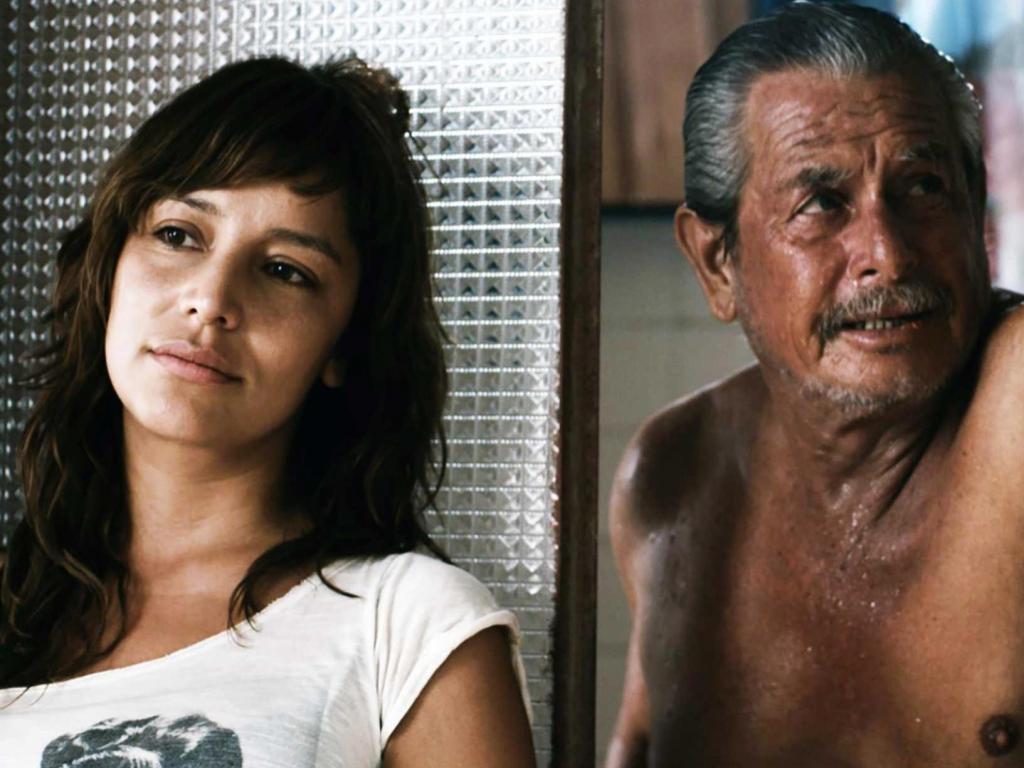Silvio (Jairo Salcedo) is a violent and impulsive tyrant of a man, who has fathered dozens of children and terrorized friends and family his whole life. He’s also dying, but not quickly. Deteriorating from some undefined pancreatic affliction, he takes two of his grandchildren, Lucia (Alma Rodriguez) and Fernando (Gabriel Mejia), to the farm he owns and insists they kill him, bribing them with inheritance. ‘Whoever has your blood has the right to take your life,’ he argues. And: ‘Suicide is for queers.’
Dust on the Tongue (Tierra en la Lengua) is a film by Colombian writer and director Ruben Mendoza. Mendoza has previously made a number of short films as well as two other features, La Sociedad del Semáforo (The Spotlight Society) and Memorias del Calavero (Memories of a Vagabond), and themes of urgency, death and darkness, as well as the use of large and overbearing landscape as a backdrop, are common players in his work. Unhinged narratives are also a common feature, and while Dust on the Tongue is a beautiful film with compelling characters, its binds are loose at best.
The film is constructed as an ill-woven collection of incidences. Silvio’s wife (Lucia and Fernando’s grandmother) has recently died, and the family members initially travels to Silvio’s property to scatter her ashes. Silvio doesn’t reveal his other motive until they arrive. After this, the film descends into a version of chaos – scenes of drinking and wandering the property, and others developing the tension created by the coveting of his land by other, external forces.
The film has been created using only natural and regular electric light, no film lighting, and while there’s an authenticity to this, it also means we sometimes can’t actually see what’s going on. This confusion extends into other, daytime scenes, in which the lack of clarity is a result of poor focus or strange cinematographic decisions. Characters’ actions are often poorly explained, or not explained at all, and the continuity of the film is regularly interrupted. While this could be a deliberate decision by Mendoza to portray the darkness and fraught uncertainty of the situation, it tips the balance to make for a bumpy and sometimes frustrating ride.
Silvio’s violence and cruelty, his bigoted views and deep unhappiness, scatter the film like mean pieces of shrapnel. Yet he remains compelling. His grandchildren harbor a wry affection for their grandfather, mocking his flaws regularly and observing his demise with interest, but also expressing tenderness that extends beyond the borders of obligation. Salcedo’s performance means that we feel the same – we hate Silvio, but are also somehow charmed by his unforgiving abruptness.
Mendoza has based Silvio on his own grandfather, Don Julio, who he is quoted in the Latin Post as describing as ‘a divine monster’. These conflicted parallels between hate and affection are what drive the movie, to compelling effect. Ultimately, though, Dust on the Tongue is also a confusing journey that loses its way more than once, and possibly its audience in the process.
Rating: 3 ½ stars out of 4
Dust on the Tongue (Tierra en la Lengua)
Director: Rubén Mendoza
Colombia, 2014, 88 mins
Spanish Film Festival
www.spanishfilmfestival.com
Sydney: 21 April – 10 May
Melbourne: 22 April – 10 May
Brisbane: 29 April – 13 May
Canberra: 23 April – 6 May
Adelaide: 6-20 May
Perth: 23 April – 6 May
Byron Bay: 30 April – 7 May
Hobart: 7-13 May
Actors:
Director:
Format:
Country:
Release:





